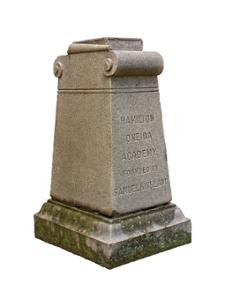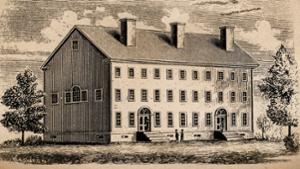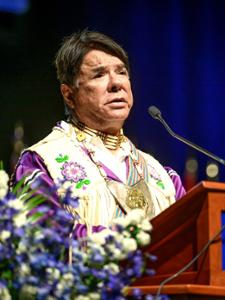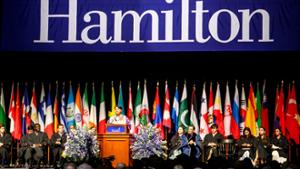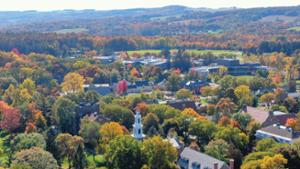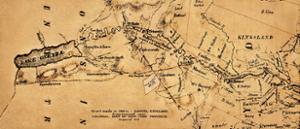
Built on a Promise
Co-created with members of the Oneida Indian Nation, the statement both honors this place and reflects a relationship grounded in ongoing collaboration. “With humility and pride,” it begins, “Hamilton College acknowledges its campus sits on the ancestral homelands of the Oneida Indian Nation.”
The connection between the two institutions dates back to 1793, when Oneida Chief Shenendoah gifted land to the Rev. Samuel Kirkland to bring their shared vision to life: a school where Native and settler youth could learn together and build mutual understanding through education. That vision, often referred to as the Promise of 1793, led to the founding of the Hamilton-Oneida Academy, a school built upon Indigenous reciprocity and inclusivity.
Though that vision never came to fruition as intended, and the academy eventually became Hamilton College in 1812, the partnership created a spirit of connection and mutual respect between the Oneida Indian Nation and the College on the Hill. The Land Acknowledgment and the collaborative process that shaped it illustrate how an imperfect past can serve as a guidepost for continued dialogue, responsibility, and shared work moving forward.
A Partnership Reaffirmed
The relationship between Hamilton and the Oneida Indian Nation has included periods of both engagement and quiet. A pivotal moment came in 2016 with a meeting between then President David Wippman and Ray Halbritter, Oneida Indian Nation Representative and CEO of Turning Stone Enterprises. That conversation led to the establishment of a liaison role in 2022 that has helped facilitate communication and partnership. Around the same time, under the leadership of Dean of Faculty Ngoni Munemo, the College made establishing an academic program in American Indian and Indigenous Studies a strategic priority.
As momentum continued to build, Hamilton welcomed Brianna Burke to its faculty in 2023 in a newly created role: faculty fellow in Native American and Indigenous Studies. In the ensuing months, Burke was among those who worked with members of the Oneida Indian Nation on a variety of significant milestones that exemplify the depth and richness of this partnership, including the development of the Land Acknowledgment.
“This renewed partnership is grounded in shared history, mutual respect, and a commitment to education and cultural understanding,” said Associate Vice President for Academic Affairs Nathan Goodale, who co-leads the initiative with Burke. “Hamilton College and the Oneida Indian Nation are uniquely positioned to advance narratives that challenge dominant historical frameworks, highlight Indigenous perspectives, and inspire thoughtful dialogue about the future of America.”
Hamilton invited Halbritter to speak at Convocation in 2024, where he welcomed new students to Oneida sovereign lands. As part of his visit, he presented President Steven Tepper with an Oneida Indian Nation flag, a symbol of friendship and shared commitment that has since been displayed at College ceremonies.
“Hamilton College and the Oneida Indian Nation are uniquely positioned to advance narratives that challenge dominant historical frameworks, highlight Indigenous perspectives, and inspire thoughtful dialogue about the future of America.
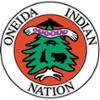
From Vision to Acknowledgment
While many institutions draft land acknowledgments internally, Hamilton’s is different. The statement was co-created with the Oneida Indian Nation through months of dialogue, reflection, and revision. Language experts from the Nation provided written and spoken translations in the Oneida language, a gesture that both deepened the statement’s meaning and offered important educational value.
As part of the process, the College hosted open meetings where students, faculty, and staff were invited to reflect on the statement and consider how Hamilton could uphold the commitments within it. One key suggestion — from both the Oneida Indian Nation and guidelines from the Native Governance Center — was to clearly state how the College would act on the values the statement expresses. That feedback informed a key line in the final version: “Through sharing our community and educational resources, we are committed to building a sustainable partnership with the Oneida Indian Nation and the Haudenosaunee peoples.”
A Grant for a New Minor
In early 2025, Hamilton received a $750,000 grant from the Mellon Foundation to support the launch of an interdisciplinary program in American Indian and Indigenous Studies (AIIS). The minor — to be offered beginning in the 2025–26 academic year — will invite students to engage deeply with Indigenous histories, knowledge systems, and contemporary issues through a liberal arts lens.
The AIIS program builds upon Hamilton’s foundational relationship with the Oneida Indian Nation and reflects a broader commitment to inclusive, place-based education. Students will explore urgent questions about land, identity, sovereignty, environmental justice, and decolonization — key issues that intersect meaningfully with nearly every academic discipline.
In addition to coursework, the initiative will support cultural programming, research collaborations, and new opportunities for student learning. Elements include:
- Hiring two new faculty members specializing in Native and Indigenous studies
- Annual grants for existing faculty to develop new courses
- Summer research projects
- Student internships
- Annual public events co-hosted with the Oneida Indian Nation
Programs beyond the classroom, which are being developed by Hamilton to align with the College's academic goals, will begin with an Indigenous Film Festival in 2025, followed by a Truth and Reconciliation program in 2026 and a Resilience and Sovereignty speaker series in 2027.
The grant will also fund a new AIIS program coordinator — ideally a member of the Oneida Indian Nation — to support the partnership and help guide the program’s direction.
A Living Commitment
Through these efforts, Hamilton is not only honoring its history; it is continuing to build a more thoughtful and inclusive academic community, one shaped by relationships that evolve over time.
“Our enduring collaboration not only honors the past,” the College’s Land Acknowledgment concludes, “but also sets the stage for a future in which education, cultural exchange, and mutual respect thrive between our communities and inspire generations to come.”
As the Baccalaureate speaker for the Class of 2025, Halbritter again addressed the Hamilton community, reflecting on the College’s legacy. As he acknowledged that the Hamilton-Oneida Academy ultimately did not fulfill its original mission, he emphasized that does not make it a failure. “While the vision laid out for this institution may not have been realized in its earliest moments, they are more clearly seen in the incredible legacy Hamilton College continues to build today,” Halbritter said. “That is something both Chief Shenendoah and Samuel Kirkland would have found especially meaningful. One of the guiding principles we follow as Oneida people is to do all things for the benefit of the Seventh Generation. We know that our actions and choices have a far-reaching impact and seek to always act with our grandchildren’s grandchildren in mind. The evolution of this College from its humble beginnings and the community it is building today serve as a prime example of this kind of vision.”
Posted July 16, 2025
Related News
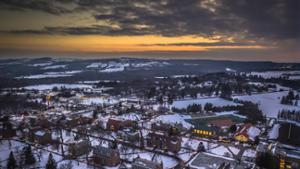
Mellon Foundation Awards Hamilton $750K for American Indian and Indigenous Studies
The Mellon Foundation has awarded Hamilton College a $750,000 grant to establish a program in American Indian and Indigenous Studies (AIIS).
